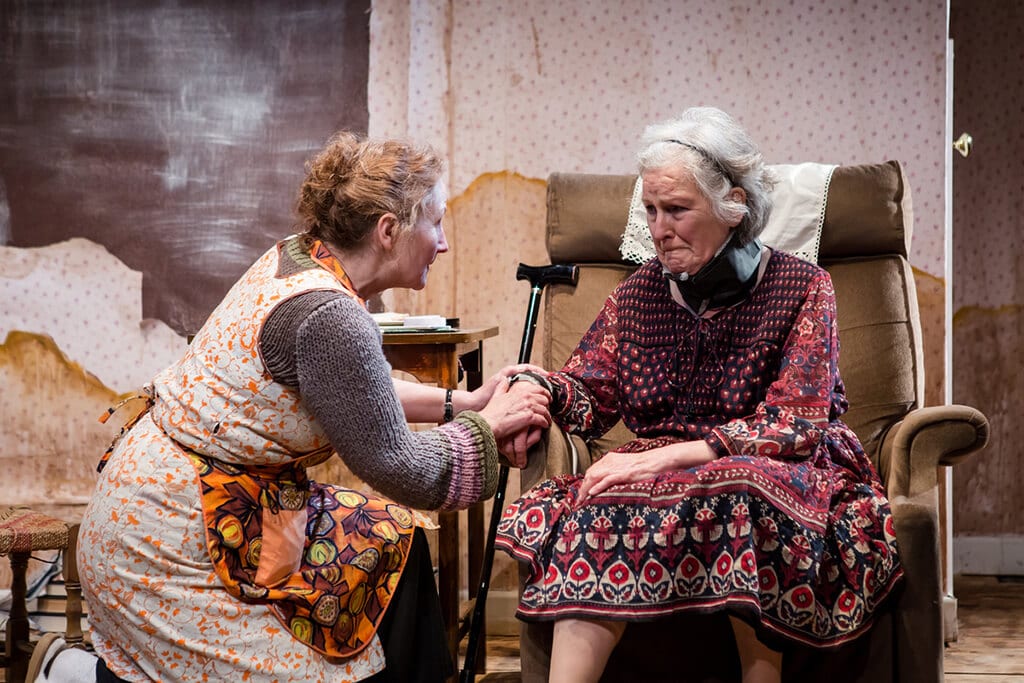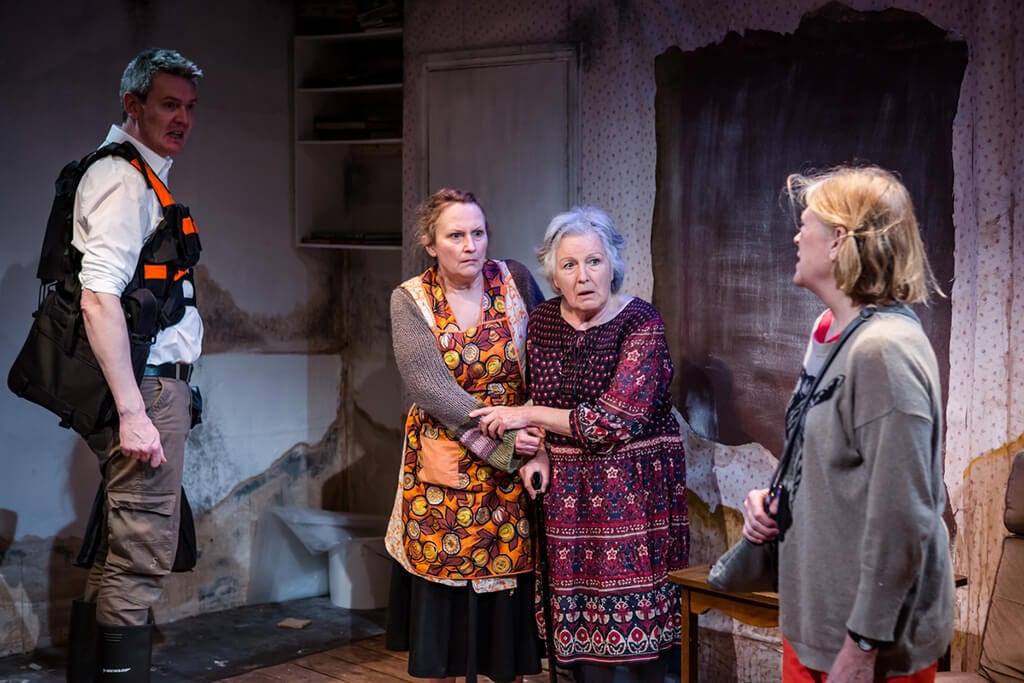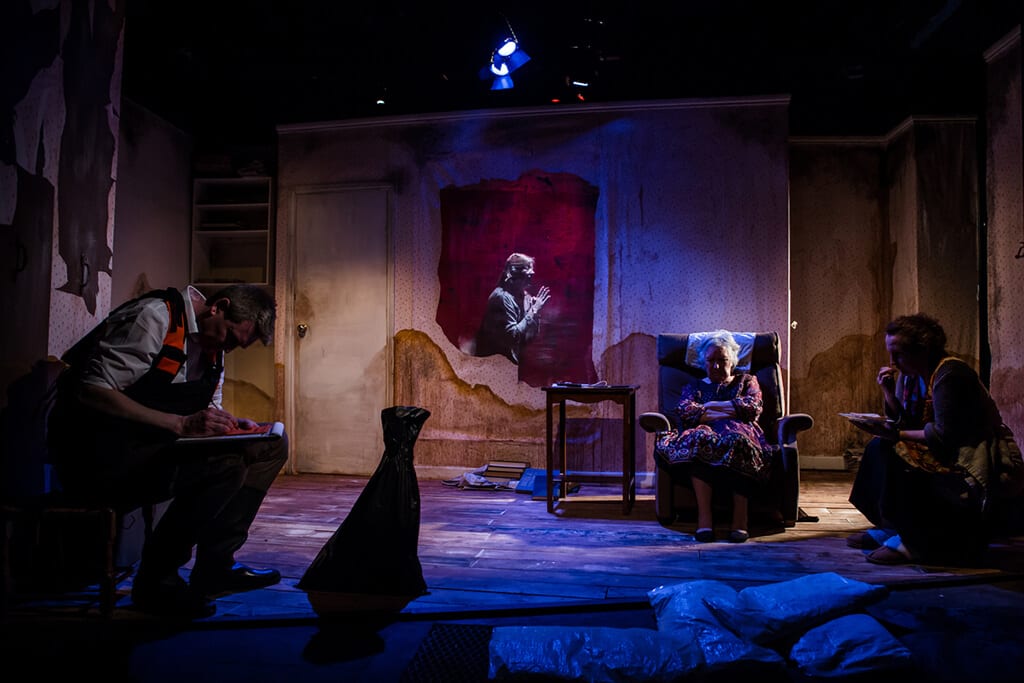Age is not something the entertainment world tends to deal well with—most movie stars almost never look a day beyond forty, and the ones that do are always lauded as serious actors, with chops that go beyond looks. This is especially true in the case of women, where youth is paired hand-in-hand with success. With the exception of greats such as Meryl Streep, Barbra Streisand and Judi Dench, few elderly women are ever truly visible in the media. How refreshing then to watch a play where three out of the five casts members are not aged between 18 and 40. Animals’s brilliant satirical bent forces us to confront our relationship with age and how we perceive it.
Animals is set in a post-Flood dystopia where to be aged and “a burden on society” is the ultimate crime, punishable by involuntary euthanasia. The story follows the struggle of Norma Pratt and her housekeeper, Joy, to escape their prescribed dark fate. The world is coded into binaries and categories—minors below the age of 18 are treated like children and must take an Insurgent-like exam to discern if they “merit” as useful members of society. Setting mirrors character closely, in this artfully designed production by Max Dorey: Norma’s house is decayed, with peeling wallpaper and signs of damp, whilst Maya, not quite 18, strides back and forth between undefined spaces. The conflict between age and youth plays itself out to great effect; young Maya is dressed in a bubble-wrap jacket and bubblegum pink bicycle gear whilst the three women trot around in skirts. The words “totally” and “fun” (prescribed “legal” words) spill out of Maya’s mouth in a frothy profusion; the women complain in bitter monologues that wind around and around. They could not be more different.
Marlene Sidaway’s performance as crotchety Norma is an absolute delight to watch—she plays the character’s know-it-all strains wonderfully, and slips in and out of a maudlin sensibility easily. All three women shine: they recreate the trope of squabbling biddies with such fervour and energy that there are times when you’d think they were twenty years younger. Personally, Sadie Shimmin’s Joy was my favourite. She brings tones of comedy to counterpoint against the rather grim realities of the play. Slightly bitchy, caught in a state of constant paranoia and exhausted by the terror of their oncoming fates, their fears reach out to the audience and allow us to feel alongside them. Again and again cries of “I don’t want to die!” or “I’m not ready to die!” echo throughout the small space. Their strength and their determination to carry on despite the bleak outlook, subtly (and not so) defying the edicts of their society has you silently cheering on these mad “witches” from your seats.
Occasionally, the roar of Steve Hansell’s Noah comes off a bit excessive, but in general Adams’s script and the performances manage to rein in (indeed, even manipulate) the unreality of the play. Dystopia always functions to over-exaggerate conditions in order to bring out their implications to the greatest effect. The Utility’s “red permits” represent our own treatment of the elderly—nursing homes and the slashing of benefits are the play’s van’s trunks full of geriatric corpses. Dystopias, in general, often fall prey to the conundrum of implausibility, yet Adams’s dialogue and the control of Cagnacci’s direction ensures that we never doubt the plausibility of the play’s world. The horror of the play lies in its plausibility, and its potential as the future of our society. The play is never excessive, always purposeful in its movement: the cruelty of the Sandwich Circle’s cannibalism is balanced against the cruelty of the Utility’s enforced euthanasia. And perhaps we may find ourselves a little uneasy at the play’s comedy, which is full and rich in its conception.
The women do not cower. They do not submit, and this is their triumph. On a slightly wider scope, Animals’s treasure also lies in its suggestion that any dystopian society’s rules—whether it be the rigorous sorting of virtues in Divergent, or the burning of books in Fahrenheit 451—are inherently dangerous to society in its inflexibility. Maya’s voracious curiosity is hemmed in whilst the elderly are eliminated—Noah, middle-aged and “legal”, is oddly enough at the centre of the two extremes, chafing at either side. Adams’s play offers us an interesting and endlessly questioning insight into how we crave categorisation, yet how humanity continues to defy it.




